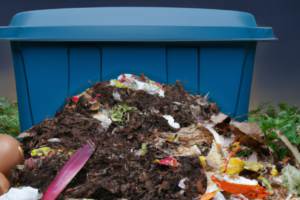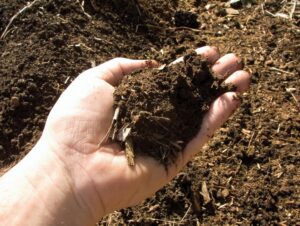Introduction
There’s an old saying, “What’s old is new again.” And friends, let me tell you, when it comes to farming and gardening, this couldn’t be more accurate. The buzzword in the farming community right now is Ultracompost. So, what exactly is this?
The Magic Behind Ultracompost
The magic of Ultracompost really comes down to its ingredients and how they interact with the soil and plants. Let’s steer clear of that image if you’re thinking of a witch’s brew boiling over a roaring fire. It’s less about dark magic and more about natural wonder.
So what’s in this magic mix?
Ultracompost is essentially supercompost and volcanic ash. Think of supercompost as the strong, stable base. Like the foundation of a skyscraper or the rhythm section in a band, it sets the stage for everything else. It is rich in organic material, which helps improve soil structure and water-holding capacity. And this isn’t any old water we’re talking about – it’s the lifeblood for your plants. Supercompost also slowly releases nutrients, acting like a slow-drip coffee maker for your plants’ roots. A steady supply of nutrients without the need for constant top-ups? Sign me up!
Now, let’s introduce the secret weapon – volcanic ash. This stuff is like the magic dust sprinkled on the supercompost base. Volcanic ash brings to the party a wealth of minerals and trace elements. These really supercharge the compost and earn it the “ultra” moniker. Minerals such as potassium, phosphorus, and calcium – essential for plant growth – are abundant in volcanic ash. And trace elements? They’re like the tiny screws in a giant machine – small but oh-so-critical for the smooth functioning of the whole operation. Things like copper, manganese, and zinc are all invited to the Ultracompost jamboree.
And it’s not just about the nutrients. The volcanic ash helps to improve soil structure too. It increases the ability of the soil to hold onto those valuable nutrients and water and encourages beneficial soil microbes. These little fellas are the unsung heroes of your garden – breaking down organic material, helping plants access nutrients, and even protecting against disease.
So, the magic behind Ultracompost is a combination of potent organic matter, mineral-rich volcanic ash, and a lot of love for your plants. It’s a potent cocktail encouraging lush growth and a thriving ecosystem beneath the soil surface. All with a huge dollop of sustainability and environmental consciousness added in. Now that’s magic you can believe in!
The Role of Ultracompost in Organic Farming
Now let’s dive deeper into how Ultracompost plays a stellar role in organic farming, and trust me, this isn’t your everyday farm story. Picture Ultracompost as a kind of wizard, casting green spells and transforming your farming plot into a vibrant field of productivity.
Organic farming is all about maintaining a healthy, natural ecosystem, so it requires inputs that are effective and environmentally friendly. This is where Ultracompost rolls up its sleeves and gets to work.
First off, Ultracompost is essentially an ultra-nutrient booster. Its nutrient-rich composition ensures that your soil is not just fed but well-fed. It’s like inviting a Michelin-star chef to cook every meal for your soil. The rich nutrients derived from the volcanic ash and supercompost ensure your plants have a balanced diet. In fact, it provides plants with such a great spread of nutrients that they might feel they’re at a gourmet buffet!
Moreover, Ultracompost improves soil fertility by enhancing soil structure and increasing water-holding capacity. Imagine giving your soil a spa treatment with a mud mask and all. The improved soil structure allows roots to penetrate deeper and spread wider. It’s like giving your plants more room to stretch their legs, and who doesn’t love that extra legroom?
Let’s also not forget about the slow nutrient release of Ultracompost. It works like a slow cooker, consistently and gradually releasing plant nutrients. The slow and steady release provides a constant food supply and prevents nutrient leaching. So, it’s like having a well-paced seven-course meal instead of a hurried fast-food snack.
Ultracompost also plays a vital role in pest and disease management in organic farming. The rich and diverse nutrients create a more robust plant immune system, helping them fend off diseases and pests as effectively as a ninja warding off foes. And who knew plants could be ninjas, right?
Last but not least, by using Ultracompost, you also reduce dependence on synthetic fertilizers. Synthetic fertilizers are like junk food for the soil – quick and easy but unhealthy in the long run. Ultracompost, on the other hand, is like a healthy home-cooked meal – nourishing and wholesome.
In summary, Ultracompost helps to create a more sustainable, productive, and healthy farming system. It’s an all-in-one solution, a farm’s best friend, and a wizard casting enchanting green spells on your organic farming journey. The role of Ultracompost in organic farming? We’d say it’s pretty ultra-mazing!
The Making of Ultracompost
Ultracompost is a lot like your favorite superhero: it’s super powerful, and versatile, and though it may seem complex, it actually has quite an understandable origin story. Now, allow me to guide you as we journey into the exciting, not-so-mysterious process of creating Ultracompost.
Required Materials and Their Importance
The Importance of Supercompost
Before we can become ultra, we must first be super, right? The supercompost is the backbone of Ultracompost. It comprises decomposed organic material such as fruit and vegetable scraps, coffee grounds, leaves, and grass clippings. It’s akin to a parent’s home-cooked meal – familiar, comforting, and rich with all the good stuff. The organic materials break down to provide diverse nutrients for your soil, creating a healthier, more vibrant environment for plant growth. Supercompost is the superhero base that lays the groundwork for Ultracompost.
The Volcanic Ash: The Game Changer
If Supercompost is the superhero base, volcanic ash is the radioactive spider, the gamma rays, or the cosmic energy that transforms the ordinary into the extraordinary. Volcanic ash is rich in trace minerals that are often lacking in other forms of compost. These minerals, like iron, zinc, and manganese, are vital for healthy plant growth. Just like how spinach gave Popeye his strength, volcanic ash in Ultracompost gives your plants the nutrient boost they need to flourish.
Step by Step Ultracompost Production Process
Now that we know the secret ingredients let’s roll up our sleeves and start making our very own Ultracompost. First, you need a good amount of supercompost. Think of it as the crust of our nutrient-rich pie. Spread it evenly in a large composting bin or a designated area in your yard.
Next, it’s time for the magic dust – the volcanic ash. Apply a layer of volcanic ash over the supercompost. How much, you ask? If we stick with the pie analogy, think of the ash as the filling, balancing it evenly over the compost. Remember, too much can make it overpowering, and too little may not boost the desired nutrient.
Once you have the layers in place, use a garden fork or shovel to mix the two components thoroughly. You’re aiming for a uniform blend, like a perfectly mixed smoothie.
Finally, cover your soon-to-be Ultracompost pile with a tarp or a thick layer of straw to retain moisture and heat. Over the next few weeks, the supercompost and volcanic ash will mingle, mix, and eventually morph into nutrient-packed Ultracompost. Remember to turn the pile every week to ensure an even decomposition process.
There you have it, folks! The recipe for creating your very own Ultracompost at home. Just remember, like any good recipe, it requires a bit of patience, some love, and a sprinkle of nature’s magic. But the result – a lush, thriving garden – will be worth every effort. And who knows? You might just find yourself falling in love with the enchanting art of composting!
The Benefits of Ultracompost
If you’ve ever wondered why Ultracompost is the toast of the compost town, you’re in for a treat. Just like a superhero saves the day, Ultracompost sweeps into your garden with a host of benefits that transform your green patch. Let’s put on our gardening gloves and delve into the wonderful world of Ultracompost benefits.
Nutrient Boost for Soil and Plants
Ultracompost is a nutrient powerhouse, offering a blend of macro and micronutrients, all vital for plant growth. Think of it as a fitness trainer who knows just what diet your plants need to stay in peak condition. These nutrients, sourced from supercompost and volcanic ash, are released slowly into the soil, giving your plants a steady and long-lasting food supply. So, whether you’re growing tomatoes, roses, or that difficult bonsai, Ultracompost has got your plants covered.
Improved Soil Structure and Water Retention
Healthy soil is about more than just nutrients. The soil’s physical structure and water retention capacity can make a huge difference to plant growth. Ultracompost is a maestro when it comes to improving soil structure. It’s like that renovation show host who turns a drab house into a dream home. Adding Ultracompost can convert hard, clumpy soil into fluffy, crumbly goodness that plant roots just love to grow in.
Plus, Ultracompost is a champ at holding onto water. Imagine if your soil could store water like a camel stores fat. That’s precisely the kind of hydration reservoir Ultracompost can help create. This reduces the need for frequent watering and ensures your plants have a steady water supply even during drier periods.
Supporting Soil Biodiversity
Ultracompost isn’t just great for your plants. It’s a hit with the little critters in your soil too. It supports a rich, diverse community of soil microorganisms integral to a healthy soil ecosystem. You could say Ultracompost is like the life of the party, getting everyone involved in the fun!
These microorganisms help break down organic matter further, releasing even more nutrients. They also help suppress soil-borne diseases, acting like the security team keeping your soil safe. In the big garden party of life, Ultracompost helps your soil microbiome let loose and really thrive.
Environmentally Friendly and Economically Beneficial
Last but not least, Ultracompost is a friend of the environment and your pocket. By opting for Ultracompost, you’re reducing your dependence on synthetic fertilizers, which can contribute to pollution and degradation of soil health. It’s like choosing to cycle instead of taking your car – you’re doing good for the environment and also getting a health benefit!
On the economic front, Ultracompost is like that savvy investment that gives excellent returns. It’s generally cheaper than synthetic fertilizers and provides long-lasting benefits, reducing the need for frequent soil amendments.
In essence, Ultracompost benefits your garden, environment, and wallet. It’s like the perfect hat trick! So next time you’re thinking about the best way to nourish your garden, remember, Ultracompost is the hero your garden needs and deserves!
,center>
The Future of Ultracompost
As we peer into the garden of the future, it’s clear that Ultracompost is set to play a starring role. Imagine a world where every green thumb, from the backyard hobbyist to the large-scale farmer, harnesses the power of Ultracompost. That’s a future I’d sign up for, and here’s why.
Going Global
In the future, we can expect to see a global rise in the use of Ultracompost. As awareness grows about the importance of organic and sustainable farming methods, more and more gardeners and farmers will turn to Ultracompost. It’s like when a new band suddenly starts topping the charts, and everyone wants to listen to their music. With its nutrient-rich composition and environmental benefits, Ultracompost will headline the world’s farming stage.
Innovations in Ultracompost Production
Advancements in technology and a greater understanding of soil science could lead to even more effective Ultracompost in the future. Imagine, for instance, a customized Ultracompost that caters specifically to the needs of certain plants or soil types. It would be like having a personal chef who knows exactly what your taste buds crave. The future of Ultracompost production looks set to blend science, technology, and nature.
Educational Initiatives
Expect to see more educational initiatives promoting the use of Ultracompost. Schools, community groups, and government agencies will likely start offering workshops and resources on how to make and use Ultracompost. It will be like having a friendly teacher by your side, showing you the ropes and helping you master the art of Ultracompost.
Partnerships and Policies
The future could see more partnerships between environmental organizations, farming groups, and policy-makers to promote Ultracompost. This might also lead to new policies or incentives to encourage its use. It’s like when the Avengers team up to save the world – with everyone working together, Ultracompost can help us save our soils!
Advances in Research
The future of Ultracompost also lies in ongoing research. Scientists continually learn more about the fascinating world of soil health and plant nutrition. As this research progresses, we may discover new ways to enhance the benefits of Ultracompost even further. So stay tuned, folks – the Ultracompost journey is just getting started!
So as we gaze into the future, it’s clear that Ultracompost has a major part to play. It’s not just about the benefits it offers today but also the potential it holds for tomorrow. Whether you’re a gardener, a farmer, or simply someone who cares about the environment, the future of Ultracompost is a journey we can all be excited to be a part of!
Conclusion
In the grand journey of organic farming, Ultracompost is the trusty steed you want by your side. It’s like the superhero of composts, swooping in to save the day. So, will you call upon this caped crusader for your gardening needs?
FAQs
What is Ultracompost?
Ultracompost is a type of compost that’s made from supercompost and volcanic ash, providing enhanced benefits over other composts.
Why should I use Ultracompost?
Ultracompost improves soil fertility, reduces the need for synthetic fertilizers, and is cost-effective, making it an ideal choice for organic farming.
How is Ultracompost made?
Ultracompost is made by mixing supercompost and volcanic ash in appropriate proportions.
Are there any drawbacks to using Ultracompost?
Ultracompost requires careful handling due to the presence of volcanic ash, and its availability can sometimes be an issue.
What is the future of Ultracompost?
Ultracompost is set to become a major player in the organic farming world due to its myriad of benefits for plants, the environment, and the economy.





Pingback: Bokashi Composting: Green Thumbs, Unite!
Pingback: Sustainable Fashion Brands: Redesigning Style Responsibly
Pingback: Sustainable Agriculture: A Green Revolution - Eco Life Wise
Pingback: Solar Farms: Harnessing the Power of the Sun - Eco Life Wise
Pingback: Three Pillars of Sustainability: A Guide to a Better Future
Pingback: Sustainable Bedding: The Ultimate Guide - Eco Life Wise
Pingback: Organic Basics: The Untamed Journey of Green Living
Pingback: Sustainable Fish: Safeguarding Our Oceans' Future | Eco Life Wise
Pingback: Organic Spices: Nature's Flavor Gems | Eco Life Wise
Pingback: Climate Change: The Facts That Will Make Your Jaw Drop! | Eco Life Wise
Pingback: Organic Mineral Makeup: A Trend Worth Trying? | Eco Life Wise
Pingback: Organic Greens: Unlock Nature's Magic in Your Kitchen! | Eco Life Wise
Pingback: Organic Protein Powder: Nature's Muscle Builder | Eco Life Wise
Pingback: Importance of Biodiversity: More Than Just a Trend | Eco Life Wise
Pingback: Best Organic Coffee Brands: Your Ultimate Coffee Experience | Eco Life Wise
Pingback: Causes of Global Warming: The Unsettling Reality | Eco Life Wise
Pingback: Best Organic Coffee Brands: Your Ultimate Coffee Experience | Eco Life Wise
Pingback: Organic Essential Oils: Unveiling the Secrets of Nature’s Essence | Eco Life Wise
Pingback: How Can I Reduce My Carbon Footprint? 8 Simple Ways | Eco Life Wise
Pingback: Why Is Organic Farming Considered More Sustainable? | Eco Life Wise
Pingback: Why Is It Important To Buy Locally Sourced Products? Here's 10 Compelling Reasons | Eco Life Wise
Pingback: Why Is Sustainable Agriculture Important: 10 Simple But Vital Reasons | Eco Life Wise
Pingback: What Is A Sustainable Diet? | Eco Life Wise
Pingback: What Is A Vegan Lifestyle And How Does It Benefit The Environment? | Eco Life Wise
Pingback: Vegan Hors D'oeuvres | Eco Life Wise
Pingback: Vegan Girl Scout Cookies | Eco Life Wise